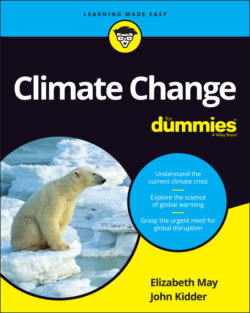Читать книгу Climate Change For Dummies - Elizabeth May - Страница 50
Plugging up the carbon sinks
ОглавлениеThe Earth’s carbon sinks, which used to be able to handle everything oxygen-breathing creatures could throw at them, aren’t able to keep up with humanity’s increased carbon dioxide production. Studies presented through the Intergovernmental Panel on Climate Change (IPCC) reports suggest a bunch of different possible consequences, ranging from a theory that new plants might appear that can soak up more carbon dioxide to the idea that carbon sinks may become full and may no longer be able to absorb any more carbon dioxide. Like anyone who works overtime, carbon sinks could become weaker as they soak up more carbon dioxide.
The ocean has stored carbon effectively in the past, but global warming is causing the oceans to do just the opposite. The top layers of the oceans — the top 2,300 feet (700 meters) have warmed a lot since 1900. That top layer is now 1.5 degrees Fahrenheit (0.83 degrees Celsius) warmer. Carbon dioxide is less soluble in warm water. The oceans push the carbon dioxide that they can’t dissolve into the air, instead. Data collected during the 1980s and 1990s suggested that both land and ocean sinks seemed to have kept up with growing emissions. However, more recent studies show that the carbon dioxide intake of some sinks, such as trees, is slowing down.
In addition to the warming impact, as carbon dioxide mixes in the top layers of ocean water, the oceans are getting more acidic. Carbon dioxide mixing with ocean water makes a chemical change to carbonic acid. Carbon dioxide is less soluble in warm water, so the acidification of oceans is worse in the colder regions, and this trend is super worrying. The increasingly acidic ocean makes it harder for sea creatures that live in shells to form those shells. Where Elizabeth and John live on Vancouver Island, aquaculture operations growing oysters and scallops have had to move the early stages of growing shells to the warmer waters of Hawaii, to then transport the scallops and oysters back to Vancouver Island’s colder waters to reach maturity. This increased acidity is measurable. In 2021, the oceans are 25 percent more acidic than in 1900.
Sinks normally absorb about half of human-caused emissions. So, if these sinks were to weaken, or even stop absorbing, they’d leave a lot more carbon dioxide in the atmosphere, on top of our already-increasing emissions.
